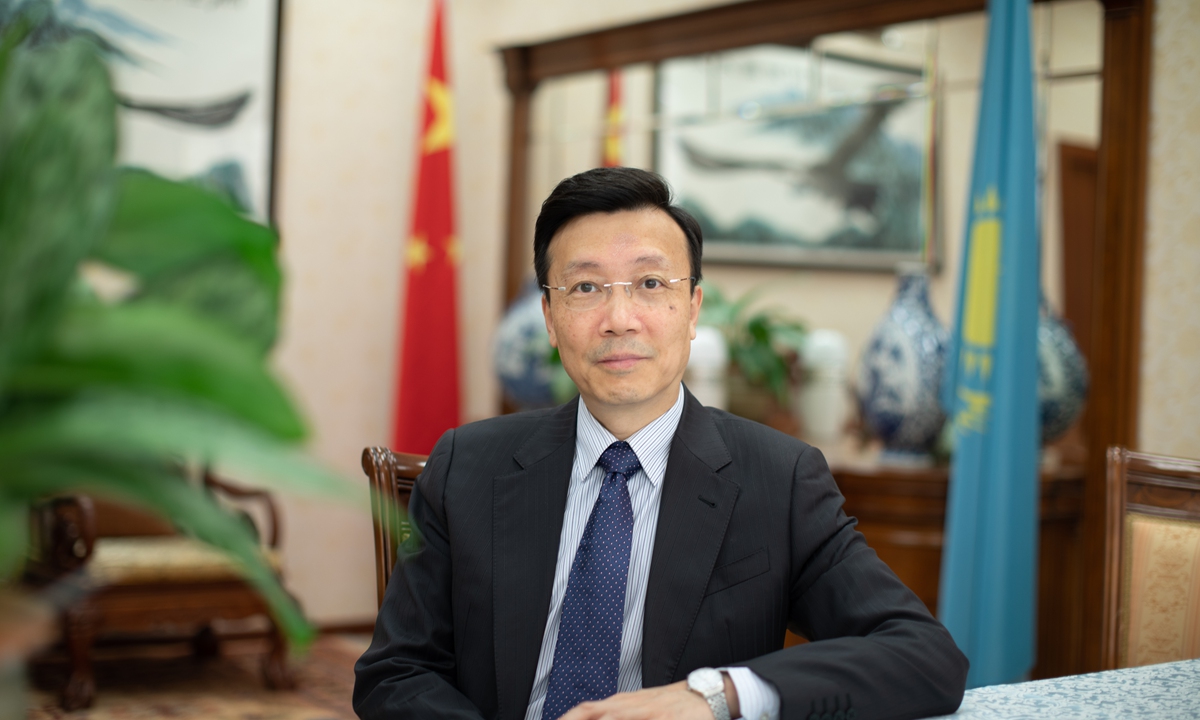10th anniversary of BRI both milestone and new starting point for China-Kazakhstan cooperation: Ambassador

Chinese Ambassador to Kazakhstan Zhang Xiao Photo: Courtesy of the Chinese Embassy in Kazakhstan
In September 2013, Chinese President Xi Jinping proposed building an "Economic Belt along the Silk Road" at Nazarbayev University in Astana, Kazakhstan. It was the first time the Belt and Road Initiative (BRI) was proposed. Kazakhstan carries special significance for the BRI not only because it is the country where the BRI was first proposed, but also because as a pioneer in jointly building the BRI, Kazakhstan has achieved fruitful results in cooperation with China during the past 10 years.
On the 10th anniversary of the BRI, the Global Times (GT) conducted an exclusive interview with Chinese Ambassador to Kazakhstan Zhang Xiao (Zhang), who said the anniversary is both a milestone and a new starting point for China-Kazakhstan cooperation. In the future, the two will jointly promote high-quality development of the BRI.
GT: This year marks the 10th anniversary of Belt and Road Initiative (BRI), and Kazakhstan is where the initiative was first proposed. How do you evaluate the cooperation results between China and Kazakhstan under the BRI?
Zhang: Over the past decade, both countries have continuously deepened and solidified cooperation in various fields, achieving fruitful and practical cooperation results. They have become a successful example for implementing the BRI globally.
In the past 10 years, policy communication between the two countries has continuously deepened. Under the strategic guidance of the leaders of China and Kazakhstan, the BRI has been deeply aligned with Kazakhstan's development strategy, continuously promoting stable and far-reaching pragmatic cooperation between the two countries.
In those 10 years, trade and investment between China and Kazakhstan have been upgraded and improved. In 2022, the volume of bilateral trade exceeded $31 billion for the first time, a year-on-year increase of 23.7 percent. China has consistently ranked as Kazakhstan's second-largest trading partner, second-largest export destination, and second-largest source of imports for many years.
Connectivity between China and Kazakhstan has continued to be upgraded during the past 10 years. Both countries have vigorously developed transit transportation and international land and sea multimodal transport. The China-Europe freight trains have been running non-stop, with over 13,000 trains passing through the Alashankou and Khorgos ports in Northwest China's Xinjiang Uygur Autonomous Region in 2022, an increase of 8.7 percent compared to the previous year. From January to July 2023, more than 8,000 trains passed through these ports.
In the past decade, emerging industries have also flourished. China and Kazakhstan have continuously created cooperation highlights in areas such as healthcare, cross-border e-commerce, digital economy, automobile manufacturing, and modern agriculture. Kazakhstan has participated in the China International Import Expo for five consecutive years, actively developing cross-border e-commerce, with a total of 220 Kazakh companies joining the Alibaba international e-commerce platform.
People-to-people exchanges have also deepened during the past 10 years. The five Confucius Institutes established in Kazakhstan by China are operating smoothly, and the Luban Workshop is also about to be established. With the signing of the visa-free agreement between China and Kazakhstan and the launch of the 2024 Kazakhstan Tourism Year in China, people-to-people exchanges and cultural exchanges between the two countries will reach a new level.
The 10th anniversary of the BRI in Kazakhstan is both a milestone and a new starting point for China-Kazakhstan cooperation. In the future, the two will adhere to the principles of consultation, joint construction, and shared benefits, with the goal of "high standards, sustainability, and benefiting the people," and they will jointly promote the deep, multi-sectoral, and high-quality development of the BRI.
GT: According to your experience and observations in Kazakhstan, what substantial benefits has the BRI brought to local people?
Zhang: From trade and investment to capacity cooperation, from connectivity to emerging industries, from joint efforts in fighting against the pandemic to cultural exchanges, the all-round mutually beneficial cooperation between China and Kazakhstan has demonstrated strong vitality and resilience, and the foundation of people-to-people friendship is becoming increasingly solid.
A large number of exemplary projects have been built by both sides, such as the Shymkent Oil Refinery, the photovoltaic power plant in Almaty, and the Orda glass plant in Kazakhstan's Kyzylorda Region. These have greatly improved Kazakhstan's industrialization level and benefited the people.
GT: According to the Xi'an Declaration of the China-Central Asia Summit, which concluded in Xi'an in May, it stressed the alignment of the BRI with national development strategies of the Central Asian states, including the New Economic Policy of the Republic of Kazakhstan. In your opinion, which fields do you think will have the most potential for cooperation between the two countries in the future?
Zhang: As the declaration has emphasized, the two countries will consolidate existing areas of cooperation while exploring new areas of growth, continuously optimizing trade structure, expanding trade fields, facilitating investment exchanges, and enhancing infrastructure connectivity.
In the traditional energy sector, cooperation in areas such as oil, natural gas, and uranium will continue to deepen. In the clean energy sector, cooperation in areas such as wind power, photovoltaics, and solar thermal energy will be actively expanded.
In the innovation sector, cooperation in areas such as e-commerce, big data, artificial intelligence, and 5G will be developed. In the field of infrastructure connectivity, efforts will be made to improve cross-border transportation and port handling capacity, while also promoting land and sea interconnectivity.
In addition, there is great potential for cooperation between the two countries in areas such as mineral extraction and processing, machinery manufacturing, chemicals, construction materials, and agriculture.
GT: Cooperation in the field of energy, including oil and gas, is the key aspect of China-Kazakhstan relations. What are the future energy cooperation plans between the two countries? What is the significance of strengthening cooperation with Kazakhstan and other Central Asian countries in the field of energy for ensuring China's strategic security?
Zhang: Energy cooperation is a key area of cooperation between China and Kazakhstan under the BRI. Over the years, the foundation of energy cooperation between China and Kazakhstan has been solid and fruitful, and it has become a cornerstone in promoting the construction of the BRI between the two countries. In the future, the position and role of oil and gas resources from Kazakhstan in China's energy security supply system will become even more important.
Against the backdrop of global efforts to address climate change and accelerate the clean and low-carbon transformation of energy, both China and Kazakhstan face challenges in green, low-carbon, and sustainable development. In recent years, China's renewable energy has been steadily developing, and while promoting its own transformation and development, it is also actively expanding cooperation with Kazakhstan in the field of new energy, helping to facilitate local energy transformation.
GT: In addition to traditional fields, we have noticed that in recent years, countries in Central Asia, such as Kazakhstan, have shown great interest in China's green development and emerging sectors such as e-commerce. Could you please introduce the cooperative achievements and future prospects between China and Kazakhstan in these fields?
Zhang: Kazakhstan has identified the development of green energy as a major direction in its national energy development strategy and has set the goal of transforming into a green economy by 2050. Cooperation in green energy has become a highlight of the economic and trade cooperation between China and Kazakhstan. Chinese companies' landing of green projects in Kazakhstan such as the 100-MW Zhanatas wind farm has greatly pushed realization of this goal.
In the field of e-commerce, Kazakhstan has vigorously supported enterprises in promoting exports through cross-border e-commerce in recent years. From 2020 to 2022, a total of 220 Kazakh enterprises have joined Alibaba's international e-commerce platform, with cumulative sales of nearly $225 million.
GT: State leaders reiterated cooperation on cracking down on terrorism during the meeting of the Council of Heads of State of the Shanghai Cooperation Organisation in July. What new threats of terrorism do you think China and Central Asian countries face? And what needs future cooperation?
Zhang: Currently, the global counter-terrorism situation is not optimistic, and Central Asia has always been at the forefront of international counter-terrorism efforts.
In this context, China will continue to strengthen security cooperation with Central Asian countries through bilateral channels and within multilateral frameworks such as the UN and the SCO. China will actively implement global security initiatives and practice a new concept of common, comprehensive, cooperative, and sustainable security.
GT: The situation in Ukraine is profoundly impacting the international landscape. Regarding the issue, to what extent do China and Kazakhstan share the same position? What coordinated cooperation can be carried out between the two countries?
Zhang: Since the outbreak of the crisis, China has offered its own wisdom to find a solution, including a paper stating its position on the political settlement of the Ukraine crisis, which was published in February. Recently, Special Representative of the Chinese Government on Eurasian Affairs Li Hui travelled to Jeddah to attend a meeting on the Ukraine issue.
The core position of China is to advocate for peace and dialogue, and to play a constructive role with the international community in promoting a political resolution.
China and Kazakhstan share identical positions on the issue and both are committed to finding a political resolution for the crisis. Both countries have the same understanding of the background and root causes of the crisis, and both believe that Ukraine should not become the forefront and battlefield of major power confrontation.
China is willing to continue strengthening communication and cooperation with regional countries, including Kazakhstan, on the issue of Ukraine. China will make more efforts in a constructive manner to prevent the situation from spiraling out of control, promote a ceasefire, and consolidate a consensus for negotiations.

A view of Almaty, Kazakhstan. Photo: Lin Xiaoyi/GT


